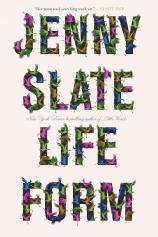Lifeform
Review
Lifeform
Toward the end of LIFEFORM is a piece titled “Headtrip.” In it, Jenny Slate rides a train on her way to an event promoting her work. It is a project she began many years ago with the man who is now her ex-husband. As the train travels to the city she used to live in when she was younger, it is physically taking her farther from her current husband, her baby daughter and the life she is happily --- if somewhat anxiously --- living now.
Sitting on the train, Slate’s thoughts move back and forth in time as she examines choices, fears and accomplishments. She wonders at the fact that this is all contained in her head, as all our thoughts are contained in our heads, and from the outside it is impossible to know what someone else is thinking or experiencing. It is a simple observation but swaddled in the honest thoughtfulness, sense of humor and keen insight that is the hallmark of Slate on the page.
"Much of LIFEFORM is a joy to read; it’s arresting, candid and delightful.... [R]eaders are assured that something witty, beautiful, powerful and thought-provoking will be found with a turn of the page."
LIFEFORM is not quite a collection of essays or a memoir; it is more a series of glimpses into Slate’s psyche, emotional confessions and literary nonfiction fancies exploring self, partnership, pregnancy and motherhood. The text is uneven with some pieces less than successful or compelling. Her point, which is personal and heartfelt, is not always clear and occasionally gets lost in her quirky narrative style. Still, many of these selections are interesting and strikingly sincere, and a handful are really stellar.
A set of pieces called “Letters to the Doctor” capture the stresses and strangeness of living in a human body, the compulsion to overthink and worry, and the need for both understanding and validation with comic frankness. The opening “Letter,” one of the best reads of the entire book, is an ode to the untapped and unrealized personal power of women and the possibilities of awakening. On the other hand, excerpts from the play Schumacher don’t come together as well, lacking the heart that characterizes much of the book.
The standout pieces are gorgeous, wonderfully odd and very smart. “Birth Visualization of Stone House” is a luminous reflection on ancestors and parenthood. Slate’s vision of her “Eternal Family House” is where all of her deceased loved ones remain with her, providing comfort, support and a ghostly companionship as she prepares to have her baby. Her thoughts on life and death here are unique but tap into a universal sense of the importance of connection. Likewise, “The Swan” tackles generational themes. Here, Slate considers her aging grandmother even as she holds her very young daughter. The imagery, metaphors and symbols are compelling and inventive, and the language is superb.
Much of LIFEFORM is a joy to read; it’s arresting, candid and delightful. Slate offers new ways to think about everything from body image to insecurities, familial inheritance to raccoons and baby seals. Some selections miss the mark, but readers are assured that something witty, beautiful, powerful and thought-provoking will be found with a turn of the page.
Reviewed by Sarah Rachel Egelman on October 25, 2024
Lifeform
- Publication Date: October 14, 2025
- Genres: Essays, Humor, Nonfiction
- Paperback: 240 pages
- Publisher: Back Bay Books
- ISBN-10: 0316264032
- ISBN-13: 9780316264037




